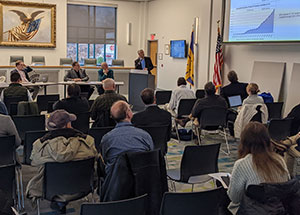Solar Stakeholders Roundtable Wrap-Up
Posted December 21, 2022

On December 8, the Clean Energy Subcommittee of Chester County's Environmental and Energy Advisory Board (EEAB) held an event to get to the bottom of what's holding individuals and businesses back from going solar in Chester County. The Solar Stakeholders Roundtable event brought together a variety of professionals involved in solar energy, from policy makers to installers, to better understand the current barriers to pursuing, developing, permitting, financing, and constructing solar projects in Chester County. Board members intend to use the information gleaned from the discussions to inform their advice and recommendations to Chester County.
EEAB members moderated three different panel discussions, each focusing on a different aspect of solar development including: financing; permitting and approvals; and siting and grid interconnection. Panelists included representatives from the Sustainable Energy Fund, Univest, TSE Solar, PECO, the Chester County Planning Commission, Tredyffrin Township, Honey Brook Township, the PA Solar and Storage Industries Association, ECA Solar, and the Delaware Valley Regional Planning Commission.
An opening presentation on the state of solar power in Pennsylvania and Chester County by Ron Celentano, President of the PA Solar and Storage Industries Association, revealed that many of the policy levers that impact the financial attractiveness of solar power occur at the state level. For example, Pennsylvania required that 0.5% of its energy must be generated by solar energy by 2021, and that milestone has been reached. Without an updated standard, the value of renewable energy credits solar projects generate will be minimal compared with those of neighboring states whose goals for solar power are much higher.
The financing focused panel noted that demand for financing for solar power installations is relatively low, which reduces the number of financial institutions who will make loans, therefore reducing competition. Potential borrowers are generally required to post collateral and show good cash flow, which can be barriers to small businesses. Related to the State's low percentage of its electricity generation mix required to come from solar power, the fluctuating rates for solar renewable energy credits can make it difficult to determine a project's payback period or return on investment.
Panelists discussing permitting and inspections stated that current permitting fees in municipalities are typically well above the recommended $450 maximum and can often amount to over 5% of the total project cost. Municipal representatives noted that although the current rate of permit applications for solar panels is manageable, municipalities may not have the capacity to quickly process permit applications if the new tax credits for solar power in the Inflation Reduction Act generate a deluge of permit applications. Additionally, many home owners' associations restrict residents from installing solar panels, which could be addressed if the State were to adopt a solar access law as many neighboring states have.
The final panel discussed siting considerations for larger scale solar power, as well as issues with interconnection to the electric grid. Land availability for larger scale solar power is a major issue in Chester County, and as a result, utility-scale solar power is expected to be more limited than in other parts of the state. The panel discussed how solar could be incentivized on land that is available, like brownfields, parking lots, and building rooftops. PECO discussed the various ways it has improved its communication with solar installers, and the vast array of information on its website.
The Environmental and Energy Advisory Board plans to compile the barriers identified during the event and develop policy recommendations for the county. Chester County is already undergoing the process of becoming SolSmart certified, a process of making it faster, easier and more affordable to go solar. The EEAB was established by the County Commissioners in 2019 to provide review and recommendations to the Commissioners and pertinent County Departments on issues related to: environmental and energy best practices; projects; programs; and county-wide plans.

